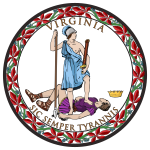| |||||||||||||||||
| |||||||||||||||||
 County results Robertson: 40–50% 50–60% 60–70% 70–80% 80–90% 90–100% Woods: 40–50% 50–60% 60–70% | |||||||||||||||||
| |||||||||||||||||
| Elections in Virginia |
|---|
 |
The 1946 United States Senate special election in Virginia was held on November 5, 1946 to elect a United States Senator from Virginia to complete the unexpired term of Carter Glass, who died on office on May 28. Absalom Willis Robertson defeated Republican Robert H. Woods.

